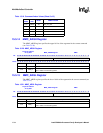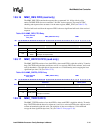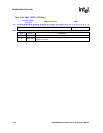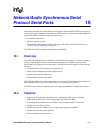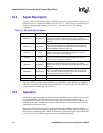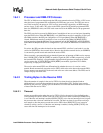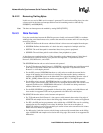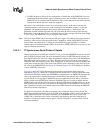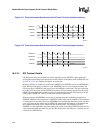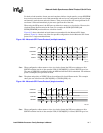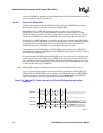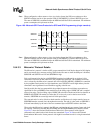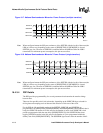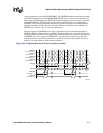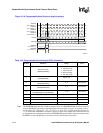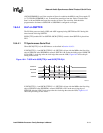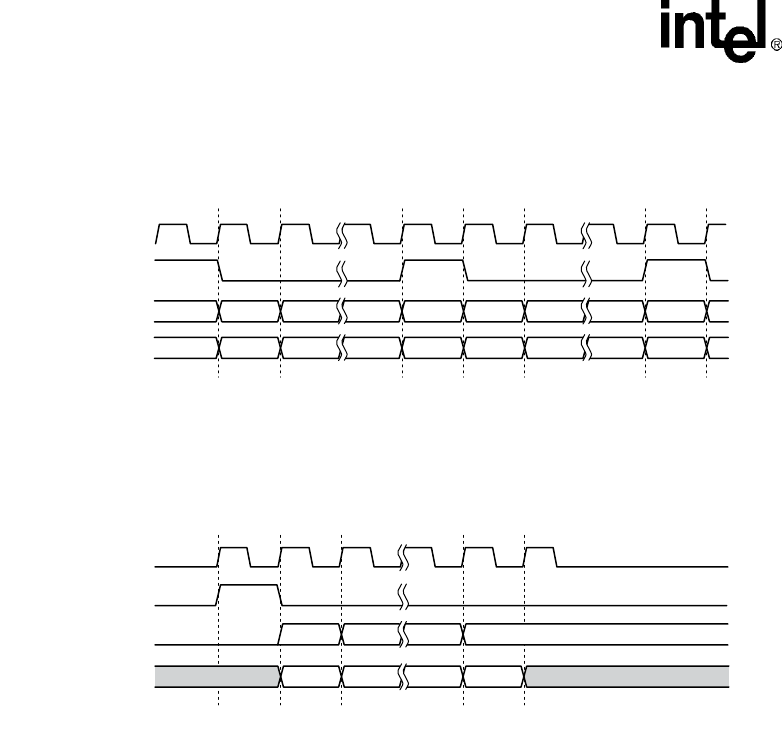
16-6 Intel® PXA26x Processor Family Developer’s Manual
Network/Audio Synchronous Serial Protocol Serial Ports
16.4.3.2 SPI Protocol Details
The SPI protocol has four possible sub-modes, depending on the SSPSCLK edges selected for
driving data and sampling received data and on the selection of the phase mode of SSPSCLK (see
Section 16.4.3.2.1 for complete descriptions of each mode).
When the SSP port is disabled or in idle mode, SSPSCLK and SSPTXD are low and SSPSFRM is
high. When transmit data is available to send, SSPSFRM goes low (one clock period before the
first rising edge of SSPSCLK) and stays low for the remainder of the frame. The most significant
bit of the serial data is driven onto SSPTXD one half-cycle later. Halfway into the first bit period,
SSPSCLK asserts high and continues toggling for the remaining data bits. Data transitions on the
falling edge of SSPSCLK. Four to 32 bits can be transferred per frame.
With the assertion of SSPSFRM, receive data is simultaneously driven from the peripheral on
SSPRXD, MSB first. Data transitions on SSPSCLK falling edges and is sampled by the controller
on rising edges. At the end of the frame, SSPSFRM is de-asserted high one clock period (one half
clock cycle after the last falling edge of SSPSCLK) after the last bit latched at its destination and
the completed incoming word is shifted into the incoming FIFO. The peripheral can drive
SSPRXD to a high-impedance state after sending the last bit of the frame. SSPTXD retains the last
value transmitted when the controller goes into idle mode, unless the SSP port is disabled or reset
(which forces SSPTXD low).
Figure 16-1. Texas Instruments Synchronous Serial Frame* Protocol (multiple transfers)
Figure 16-2. Texas Instruments Synchronous Serial Frame* Protocol (single transfers)
A9650-01
SSPSCLK
SSPSFRM
SSPTX
Bit[N] Bit[N-1] Bit[1] Bit[0] Bit[N] Bit[N-1] Bit[1]Bit[0]
SSPRX
Bit[N] Bit[N-1] Bit[1] Bit[0] Bit[N] Bit[N-1] Bit[1] Bit[0]
Bit[0]
Bit[0]
A9518-02
SSPRXD
SSPSFRM
SSPSCLK
SSPTXD
MSB 4 to 32 Bits LSB
Bit[N] Bit[N-1] Bit[1] Bit[0]
Bit[N] Bit[N-1] Bit[1] Bit[0]
Undefined Undefined



